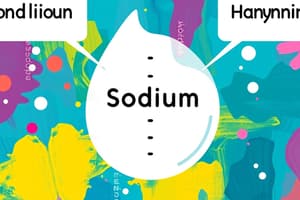Podcast
Questions and Answers
What is a common consequence of hypernatraemia?
What is a common consequence of hypernatraemia?
- Oedema
- Psychogenic polydipsia
- Aldosterone insufficiency
- Cellular dehydration (correct)
Which condition is least likely to lead to hyponatraemia?
Which condition is least likely to lead to hyponatraemia?
- Salt wasting kidney disease
- Diuretic use
- Dehydration (correct)
- ADH insufficiency
Which symptom is associated with hypernatraemia?
Which symptom is associated with hypernatraemia?
- Wet cough
- Restlessness
- Headache
- Nausea & vomiting (correct)
What is a clinical manifestation of hyponatraemia?
What is a clinical manifestation of hyponatraemia?
What is a potential cause of hypernatraemia?
What is a potential cause of hypernatraemia?
What is a common cause of hyperkalaemia?
What is a common cause of hyperkalaemia?
Which of the following signs is specifically associated with hyperkalaemia?
Which of the following signs is specifically associated with hyperkalaemia?
What treatment is used to help lower potassium levels specifically in cases of acidosis?
What treatment is used to help lower potassium levels specifically in cases of acidosis?
Hypokalaemia can result from which of the following conditions?
Hypokalaemia can result from which of the following conditions?
Which electrolyte imbalance is most associated with muscle cramps and weakness?
Which electrolyte imbalance is most associated with muscle cramps and weakness?
Flashcards are hidden until you start studying
Study Notes
Sodium Imbalances
- Hypernatraemia (uncommon) can lead to CNS impairment, often due to ADH insufficiency, diabetic ketoacidosis, or diabetes insipidus.
- Hyponatraemia (more frequent) associated with conditions like psychogenic polydipsia, 'salt wasting' kidney disease, aldosterone insufficiency, diuretic use, and dehydration.
- Consequences of Hypernatraemia include cellular dehydration, stimulating thirst, nausea, vomiting, fever, and confusion.
- Consequences of Hyponatraemia can result in edema, might be asymptomatic, or lead to CNS effects such as headaches, confusion, restlessness, and myoclonic jerks.
Potassium Imbalances
- Hyperkalaemia can result from acidosis (especially DKA), decreased aldosterone, K+ sparing diuretics, certain medications (ACE inhibitors, NSAIDs), vigorous exercise.
- Signs of Hyperkalaemia include characteristic ECG changes (peaked T waves, sine wave patterns), Kussmaul’s respiration, muscle weakness, lethargy, and nausea.
- Treatment options consist of calcium gluconate for cardiac protection, salbutamol, insulin with glucose, sodium bicarbonate (in acidosis), resin to remove K+ via GI tract, and dialysis as a last resort.
Hypokalaemia
- Common causes include thiazide diuretics, excessive aldosterone production (Conns syndrome), and excessive IV fluid administration.
- Signs of Hypokalaemia consist of muscle weakness, fatigue, headaches, and arrhythmias, particularly ectopic beats, which can be serious in the context of digoxin toxicity.
Electrolyte Balance
- The balance between reabsorption and secretion is crucial for waste elimination (urea, uric acid, creatinine) and for retaining important electrolytes (Na+, K+, Ca2+, Mg2+, Cl-).
- This regulatory process is essential for maintaining homeostasis within the body.
Studying That Suits You
Use AI to generate personalized quizzes and flashcards to suit your learning preferences.




